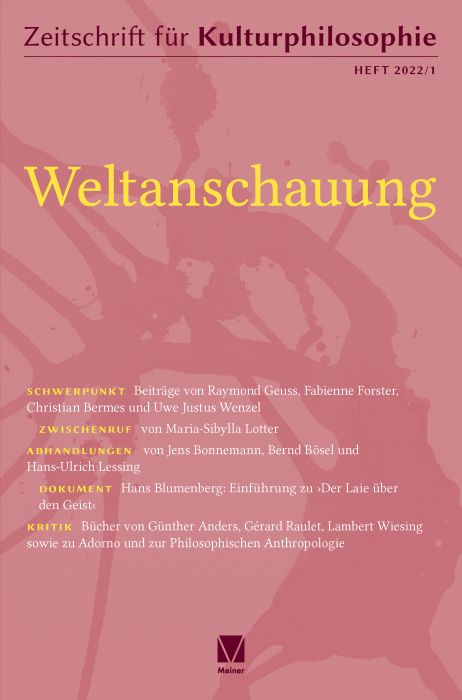Weltanschauung

Herausgegeben von Ralf Becker, Christian Bermes und Dirk Westerkamp
Reihe:
Zeitschrift für Kulturphilosophie
2022/1
Wird geladen …
Ab:
62,00 €
Ab:
ca.
Beschreibung
Bibliographische Angaben
| Einband | |
|---|---|
| DOI | |
| Auflage | |
| ISBN | |
| Sprache | |
| Originaltitel | |
| Umfang | 190 Seiten |
| Erscheinungsjahr (Copyright) | 2022 |
| Reihe | Zeitschrift für Kulturphilosophie |
| Herausgeber/in | Ralf Becker Christian Bermes Dirk Westerkamp |
| Redaktion | Sonja Feger |
| Beiträge von | Ralf Becker Christian Bermes Hans Blumenberg Jens Bonnemann Bernd Bösel Fabienne Forster Raymond Geuss Till Greite Joel B. Lande Hans-Ulrich Lessing Maria-Sibylla Lotter Uwe Justus Wenzel Dirk Westerkamp |
| Hersteller nach GPSR |
Felix Meiner Verlag GmbH |
Service
Einzelartikel als PDF
World views are in the first instance conceptual structures that offer agents an identity, however, they are subject to a continual pressure to become total systems with, purportedly, a place for everything. Historically it has been difficult to give up the search for the identity given by a totalising system, despite the fact that we see through all the systems in fact on offer. Probably, at this moment in time at least, we need to learn to tolerate the tension between our ›need‹ for an identity and our cognitive ability to recognise the illusions on which any such identity rests.
16,90 €
Charles S. Peirce’ Umgang mit einem intellektuellen Schlagwort
This essay explores the role of the German expression Weltanschauung in the philosophy of Charles Sanders Peirce. Two philosophical contexts are distinguished in which the term occurs in his writings: a) the classical pragmatist’s discussion of what constitutes Pragmatism and b) the discussion of the systematic place of a »scientific philosophy«, both in terms of its relation to other sciences and in distinction from everyday beliefs. Thus, on the one hand, the essay compares Peirce’s version of pragmatism with the views of other, more subjectivist pragmatists, who used the term »Weltanschauung« to denote their philosophical enterprises: William James and F. C. S. Schiller. On the other hand, Peirce’s ideal of scientific philosophy, particularly of scientific metaphysics, is contrasted with ›non-scientific metaphysics‹ – or how Peirce calls it: Weltanschauung. The essay also shows how his conception of scientific philosophy differs from Wilhelm Wundt’s idea that philosophy should provide a »Weltanschauung« based on the special sciences.
16,90 €
»Worldviews« are often criticised, the term »Weltanschauung« has become suspect. This analysis is true in many respects, and yet the concept of »worldviews« is associated with more than ideology. On the one hand, the essay discusses different simple uses of the term »Weltanschauung«, which are nevertheless philosophically of high interest. On the other hand, it asks what it means for understanding and cognition when worldviews are missing. It is precisely this circumstance that is referred to as »worldview-blindness« and discussed with reference to Wittgenstein. Worldview-blind is someone who is no longer able to perceive meaning in things themselves.
16,90 €
Vorüberlegungen zu einer Rechtskulturphilosophie der Sinnorientierung
»Weltanschauung« is an iridescent composite term that has made various careers – in intellectual discourses as well as in everyday language, in philosophy as well as in politics. Moreover, the word has become a specifically German-language and initially also specifically German legal term, which was and is used in the context of religious freedom. The fundamental right of individual »orientation towards meaning« (»Sinnorientierung«), formulated with the help of the worldview concept, puts religious and non-religious background beliefs in the same perspective. In this perspective, which can be interpreted in terms of cultural philosophy, the ideological neutrality (»weltanschauliche Neutralität«) of the democratic constitutional state and tolerance as a civic virtue also become issues.
16,90 €
Zur Rationalität und zum manipulativen Potential gegenwärtiger Schulddiskurse
8,90 €
Bemerkungen zu Hans Blumenbergs Radio-Essay »Der Laie über den Geist« [1966] von Nikolaus von Cues
16,90 €
Einführung zu ›Der Laie über den Geist‹
8,90 €
Lars André Amann: Verheißende Kritik. Entfaltung der Implikation des Glücks in Adornos Philosophie des Ästhetischen (Pola Groß, Adornos Lächeln. Das »Glück am Ästhetischen« in seinen literatur- und kulturtheoretischen Essays). Hannes Bajohr: Vermischter Anspruch. Günther Anders über Film und bildende Kunst (Günther Anders, Schriften zu Kunst und Film, hrsg. von Reinhard Ellensohn / Kerstin Putz). Frank Müller: Konformismus und Nonkonformismus der französischen Intellektuellen. Walter Benjamin im Paris der 1930er Jahre (Gérard Raulet, Das befristete Dasein der Gebildeten. Benjamin und die französische Intelligenz). Magnus Schlette: Die Vielfalt der Daseinsstile. Lambert Wiesing schreibt ein neues Kapitel der Philosophie des Selbstbewusstseins (Lambert Wiesing, Ich für Mich. Phänomenologie des Selbstbewusstseins). Moritz von Kalckreuth: Philosophische Anthropologie als Hintergrund interdisziplinärer Forschung? (Erik Norman Dzwiza-Ohlsen / Andreas Speer (Hrsg.), Philosophische Anthropologie als interdisziplinäre Praxis. Max Scheler, Helmuth Plessner und Nicolai Hartmann in Köln - historische und systematische Perspektiven).
14,90 €
